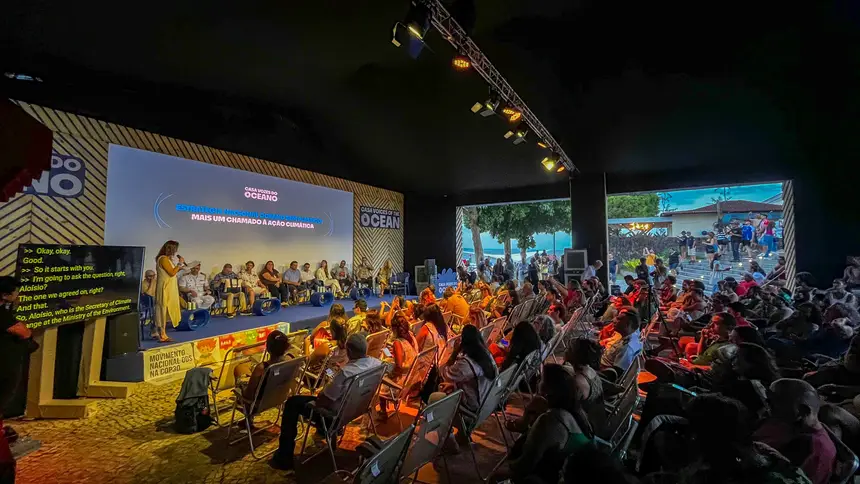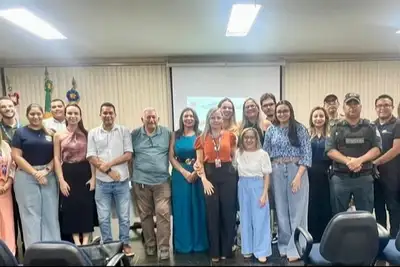Semas participated in the strategic panel for a plastic-free ocean
The House Voices of the Ocean, led by the Schurmann Family and located in the Complex of the House of Eleven Windows in Belém, was the venue for the discussion panel.

The panel "National Strategy Ocean without Plastic: another call to climate action," a parallel event of COP30, which takes place in Belém, was held last Sunday (16) at the Cinema space of the House Voices of the Ocean. The debate, of utmost importance for ocean preservation actions and combating climate change, brought together authorities, leaders, and civil society for the conversation.
The Secretary of Environment, Climate and Sustainability (Semas), as the agency responsible for this portfolio in the State of Pará, was present with the Deputy Secretary of Management and Environmental Regularity (Sagra), Rodolpho Zahluth Bastos, to present the advances, actions, and strategies of the State Government in building territorial planning for the coastal zone, which involves the discussion of waste management in favor of tides, estuaries, and a cleaner ocean with less plastic. In addition to actions for the protection of marine ecosystems and reduction of impacts on rivers and oceans.
Strategy of circular economy and expanded vision on waste
Pará, as a coastal state, aims to reinforce, recognize, and value traditional practices and knowledge of the populations living in the Atlantic region of our territory. Utilizing social technology for the management of natural resources, aligning with public policies for coastal, environmental, and territorial management, Semas has been working on the productive potential of communities, discussing beyond the structural side.
"The strategy is fundamental and needs to be transversal: it connects the issue of waste management, with the qualification of waste pickers, interrelates with the agenda of the new industry, and, above all, needs to be directly embodied in climate mitigation policies. It is important to understand that plastic is not just waste; it is a product capable of generating income, but its own production requires water, energy, and pressures natural resources. Therefore, we need to migrate from a linear economy to a circular economy that also addresses the extraction of oil and other raw materials. These elements need to be accounted for," emphasized Rodolpho.
Commitment to productive inclusion and pollution reduction
During his speech, Rodolpho stated that the State is working to correct historical distortions in the waste chain, especially in recognizing the role of waste pickers. "The intermediary of the waste continues to receive more than the waste picker, and we intend to act away from this logic with a strong state policy that values those who really do the work."
Rodolpho also emphasized that the marine agenda of the State is integrated with climate strategies and environmental governance, reinforcing that Pará has been structuring mechanisms to strengthen coastal communities, which are directly impacted by pollution on the Pará coast.
"Our policy aims to clearly bring a vision of productive inclusion of the waste picker, reinforcing shared responsibility and ensuring that this worker is at the center of the circular economy actions that the State is implementing," pointed out the deputy secretary.
Structuring cooperatives and strengthening the waste picker
In the last six months, several municipalities in Pará have received equipment such as hydraulic presses, glass crushers, conveyor belts, and other machinery. Soon, Concaves, in Belém, will be the first to receive a polystyrene extruder. Four of these cooperatives are in coastal municipalities that become major waste generators during the tourist season, such as Salinópolis, Algodoal (Marapanim), and the municipality of Belém itself.
Rodolpho, as the person responsible for management and environmental regularity, has expanded his perception and, along with his team at Semas, has been diagnosing this scenario. "When we arrive at these cooperatives, we realize that many need infrastructural support with improvements in electrical installations to support new equipment, which also leads us to act on the physical infrastructure of these spaces. This structuring is essential, especially when we recognize the centrality of the role of the waste picker," he emphasized.
National Strategy Ocean Without Plastic is presented to the public
During the panel, the national secretary of Urban Environment and Environmental Quality, Adalberto Maluf, reaffirmed that the ocean — responsible for regulating a large part of the planet's climate — has finally gained prominence within the COP. The National Strategy Ocean Without Plastic, formalized by presidential decree after years of inter-ministerial and participatory construction, was presented as a milestone to guide policies for the prevention, reduction, and elimination of plastic pollution.
The document is the result of contributions from federal agencies, states, academia, the private sector, social movements, and traditional communities. Among the highlighted points are the need to: reduce the production of single-use plastics; strengthen the circular economy; expand protected marine areas; integrate governance and coastal planning actions, and act throughout the chain, from the extraction of raw materials to the final disposal of waste.
Uniting forces to protect the ocean - The meeting concluded with a symbolic celebration of the strategy and with the commitment to continue the dialogue between different sectors. For the organizers, recovering the health of the oceans is an indispensable condition to ensure climate stability, food security, biodiversity, and the well-being of coastal populations.
Semas' participation reaffirms Pará's commitment to advancing environmental, climate, and marine policies, placing the State at the forefront of national efforts to combat plastic and protect ocean ecosystems.
Text: Lucas Maciel – Ascom Semas









